2025 Benicia & Vallejo Tour: Featured Gardens
Avant Garden
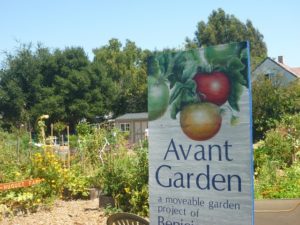 The spring garden tour will begin at 9 am at Avant Community Garden in Benicia with a Permaculture 101 talk from Anne Freiwald. She is an experienced permaculture designer and always inspirational! Anne Freiwald and Lydia Neilsen will teach this year’s Permaculture Design Certificate course that starts in August, so this is a great opportunity to learn more about that program as well. Itinerary pick up will be from 9-11 am. Sustainable Solano Board Member Maggie Kolk, a Master Gardener, will host a Master Gardener information table. Come with your questions! Also during that time, Benicia interns will be highlighting their final project with a local food tasting, seed planting, handing out a scavenger hunt for youth and more.
The spring garden tour will begin at 9 am at Avant Community Garden in Benicia with a Permaculture 101 talk from Anne Freiwald. She is an experienced permaculture designer and always inspirational! Anne Freiwald and Lydia Neilsen will teach this year’s Permaculture Design Certificate course that starts in August, so this is a great opportunity to learn more about that program as well. Itinerary pick up will be from 9-11 am. Sustainable Solano Board Member Maggie Kolk, a Master Gardener, will host a Master Gardener information table. Come with your questions! Also during that time, Benicia interns will be highlighting their final project with a local food tasting, seed planting, handing out a scavenger hunt for youth and more.
Bay Vista Homeowners Association

In June 2024, Bay Vista HOA in Benicia transformed its common area lawn into a waterwise, sustainable landscape to reduce water and beautify the space.
Michael Wedgley from Soilogical was the designer for this project. A lot of consideration went into plant selection. It was important to provide plenty of native species for habitat and food for native insects and birds, while also considering aesthetics as a critical aspect in HOA common spaces.
The plants selected and water catchment from the roof downspouts to the in-ground basins makes the landscape more resilient and builds healthy soil.
Greyhawk Grove
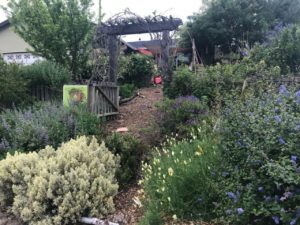
A 10-year-old established food forest with two swales that are dug out and refreshed every 2-3 years, laundry-to-landscape greywater to fruit trees, and chickens. The drip irrigation system was removed four years ago and the garden is thriving! Annual beds are hand-watered once a week during the growing season. Water elements in the form of fountains were added last year, which lured in a wild (non-venomous) snake who can sometimes be seen lounging between flagstones, and a frog who can be heard at night. Special thanks to Solano County mosquito abatement for the mosquito fish who overwintered and continue to thrive in the fountains. Greyhawk Grove is a “high-traffic-survival-of-the-fittest” garden.
***There may be lemonade and baked goods for sale by children, as well as products from the garden to give away (dried calendula, lavender, herbs, eggs, fruit, etc.).
Living and Learning
Established front yard food forest that replaced a lawn in 2016 with two swales, a laundry-to-landscape greywater system and a diverse group of plants and fruit trees that has now expanded throughout the property. There are small spaces for relaxing and enjoying throughout the garden.
Redwood Guild
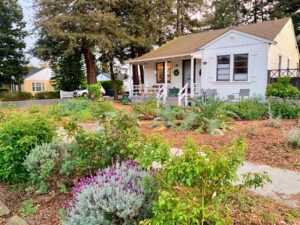 Food forest garden and greywater system installed as part of Sustainable Solano’s 2021 Permaculture Design Certificate course, with students transforming the front lawn with rain-capturing swales and planted berms and converting the sprinkler system to drip irrigation. The side yard is watered by a laundry-to-landscape greywater system and includes edible plants and native pollinators. This home has its own redwood grove, and certain plants were selected that do well in the unique conditions created by redwoods. The food forest keepers are using that knowledge to add other plants to the garden that will thrive alongside the redwoods.
Food forest garden and greywater system installed as part of Sustainable Solano’s 2021 Permaculture Design Certificate course, with students transforming the front lawn with rain-capturing swales and planted berms and converting the sprinkler system to drip irrigation. The side yard is watered by a laundry-to-landscape greywater system and includes edible plants and native pollinators. This home has its own redwood grove, and certain plants were selected that do well in the unique conditions created by redwoods. The food forest keepers are using that knowledge to add other plants to the garden that will thrive alongside the redwoods.
Wild Cherry Way
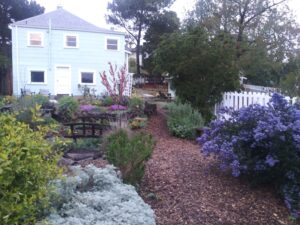
Southern slope food forest focused on pollinators, shrubs and native plants. This garden also includes fruit trees, perennial and edible plants, swales and a laundry-to-landscape greywater system.
***Sustainable Solano Board Member and Permaculture Consultant Ron Kane will be on-site to offer tours and answer questions.
Yggdrasil Garden
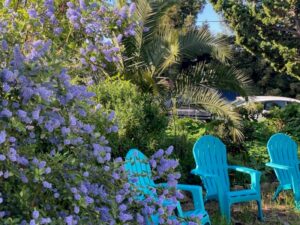 An evolving food forest garden and greywater system installed as part of Sustainable Solano’s 2022-23 Permaculture Design Certificate course.Students transformed the front yard with a rain-capturing swale and planted berms with native and pollinator-supporting plants. The west side yard’s passionfruit vines and fruit tree guilds are watered by a laundry-to-landscape greywater system. The monarch butterfly-hosting back gardens were designed by Soilogical, nurtured with specially prepared compost, and supported by a Water Service Irrigation design created as part of a Sustainable Solano irrigation class. The site’s current steward, Heath Griffith of Grow with the Flow, cultivates edible landscapes with flowers and medicinal herbs, with an eye towards community engagement and ecological justice. An herb spiral was created with bricks repurposed from the chimney of the circa 1850s historic home, retaining walls were built from pieces of historic on-site stables, and patios were made from slate and brick on-site. The east side yard (in development) is watered with both a rain-capturing swale and a laundry-to-landscape system. Displays feature the historic aspects of the home; its background and ongoing tradition of art, design, and healing; information about the Ohlone Sogorea Te Indigenous Land Trust and rematriation of Carquin land; and various permaculture systems and landscape elements.
An evolving food forest garden and greywater system installed as part of Sustainable Solano’s 2022-23 Permaculture Design Certificate course.Students transformed the front yard with a rain-capturing swale and planted berms with native and pollinator-supporting plants. The west side yard’s passionfruit vines and fruit tree guilds are watered by a laundry-to-landscape greywater system. The monarch butterfly-hosting back gardens were designed by Soilogical, nurtured with specially prepared compost, and supported by a Water Service Irrigation design created as part of a Sustainable Solano irrigation class. The site’s current steward, Heath Griffith of Grow with the Flow, cultivates edible landscapes with flowers and medicinal herbs, with an eye towards community engagement and ecological justice. An herb spiral was created with bricks repurposed from the chimney of the circa 1850s historic home, retaining walls were built from pieces of historic on-site stables, and patios were made from slate and brick on-site. The east side yard (in development) is watered with both a rain-capturing swale and a laundry-to-landscape system. Displays feature the historic aspects of the home; its background and ongoing tradition of art, design, and healing; information about the Ohlone Sogorea Te Indigenous Land Trust and rematriation of Carquin land; and various permaculture systems and landscape elements.
***Heath Griffith will be on-site to talk about permaculture, water harvesting, sustainable water use, and more! They participated in the 2022-2023 PDC and will be supporting this year’s PDC course in the fall. The garden will also feature kid-friendly hands-on activities and live music!
First Christian Church
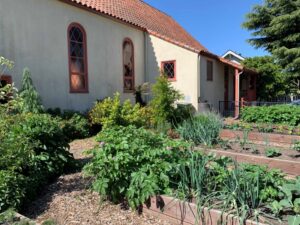
The church has two separate gardens: one is a peace garden with mostly flowers, cactus and trees, and the other is the vegetable garden, called Johnson Ranch. The vegetable garden was revived through the Solano Gardens program. The food grown is donated to the local food pantries (Faith Food Fridays, Amador Hope Center, etc.).
***Solano Gardens Program Manager Parick Murphy will be on-site to share DIY Landscape Design templates for both edible and water-efficient gardens. He also will be highlighting opportunities to get involved with local community gardens and available to discuss interest in future community gardens within the county.
Loma Vista Farm
Loma Vista Farm is a program of the Vallejo City Unified School District. Students come to the Farm every week to participate in hands-on plant and animal science lessons.
The Farm is partnered with the Friends of Loma Vista Farm, a community-based nonprofit organization, which fundraises to provide all the expenses for the day-to-day operation of the farm, including all the animal and garden expenses, as well as major ongoing capital improvements.
This has been a treasured part of the community since it began in 1974. Families and individuals are welcome to visit on a drop-in basis during open hours and enjoy seeing the many animals and gardens. The farm is also a field trip site for schools and groups on a reservation basis from all over the Bay Area.
The Food Forest Garden provides a beautiful demonstration to the public on how they can plant their own yard in a variety of fruit trees, perennial vegetables, herbs, native plants and pollinator rich plants.
***This year’s tour is on the same day as Loma Vista Farm’s annual Spring Open House, making it an extra special day to visit. Plants that the students have grown will be available in the greenhouse for sale, animal feeding will be available, as well as entertainment such as a puppet show. For more information check out Lomavistafarm.org.
Morningside Botanical Bounty
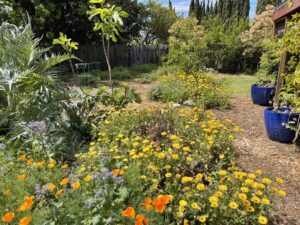 Morningside Botanical Bounty food forest was created as part of the Resilient Neighborhoods Program. This backyard garden has a laundry-to-landscape greywater system, fruit trees (pruned to keep them short and easy to harvest), swales, drip irrigation, bee-friendly plants, native plants and shade trees.
Morningside Botanical Bounty food forest was created as part of the Resilient Neighborhoods Program. This backyard garden has a laundry-to-landscape greywater system, fruit trees (pruned to keep them short and easy to harvest), swales, drip irrigation, bee-friendly plants, native plants and shade trees.
It’s now the sixth year after the install and many of the plants are still thriving. The greywater system irrigates the bougainvillea and butterfly bushes, which are popular with bees and hummingbirds. The drainage from the gutters to the swale and hugel mound prevent the yard from flooding during the rainy season. The water is stored in the earth and is available to the trees, artichoke, and roses. The peach tree, selected to be a variety resistant to leaf curl, has provided fruit even in years when most other peaches in Vallejo fail. Once a week watering of the trees on site allowed them to grow deep root systems, and they haven’t needed irrigation the last two years.
Pollinator Pathway (Vallejo People’s Garden)
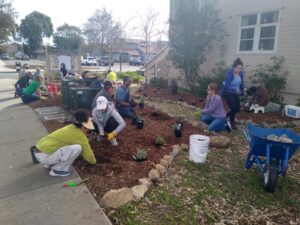
Pollinator food forest garden filled with a variety of California native plants that support the habitat of butterflies, bees, moths, wasps, hummingbirds and so much more. This garden was installed in February 2023 as a collaboration with a variety of organizations including Vallejo People’s Garden, Vallejo Project, Solano Resource Conservation District and Monarch Milkweed Project. Alana Mirror wrote three songs inspired by the installation, featured in her Pollinator Pathway Lawn Transformation Mini Series!
**Solano Resource Conservation District and Vallejo People’s Garden will be on-site promoting the Bay Area Butterfly Festival on June 1 with information on how to support pollinators! Solano RCD will have six-packs of Milkweed plants for sale for $10.
***Suzanne Briley from Vallejo People’s Garden will be giving talks on Creating Spaces for People and Wildlife, looking at ways to have garden spaces for ourselves while supporting wildlife. Talks and tours will be from 1-2 pm and 2:30-3:30 pm.
Vallejo Unity Garden (Vallejo Project)
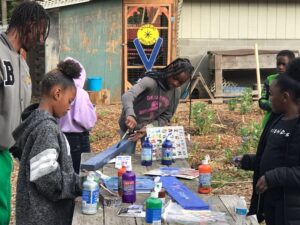
Vallejo Project’s Unity Garden initiative restored an abandoned lot that was once filled with sand and garbage and turned it into a multi-level food forest with internationally influenced farming techniques, a mealworm farm and chickens. This garden is focused on urban agriculture.
Vallejo Project imagines a Vallejo strengthened by new generations of youth and young adults who are inspired to give back to their community as role models, advocates, entrepreneurs, and leaders, and who are able to articulate and implement solutions to challenges in the community based on their learned experience and knowledge gained through youth development programs.
***Free annual veggie and companion plants to take home while supplies last
Partner Garden: 4th Second’s Cherry Community Garden

Since February 2024, 4th Second’s Cherry Community Garden has been a space rooted in well-being, hands-on learning, and nature-based experiences. The garden is home to organically cultivated produce and serves as a hub for addressing food security, advocating for environmental justice, and expanding opportunities via mentorship.
All community members are invited to actively engage by leading different garden projects that can intersect with practical life skills to further the 4th Second Youth Program’s overall mission of developing positive coping skills toward a life of self-determination. Garden guests will learn about the youth’s hands-on efforts in the garden and youth-designed projects.
***There will be multiple youth coordinators that are fluent in Spanish, and one of them is a former Rising Sun extern that is fluent in Tagalog.
Inspired Garden (Sure-Would Forest)
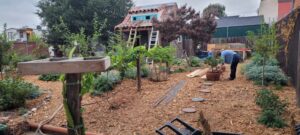
The homeowners had a nearly blank slate when they purchased this property in 2021, and soon started working on enriching the soil, retaining rainwater, and laying the groundwork for a food forest. This garden was inspired by Sustainable Solano gardens and a love of fresh fruit. In just over two years, the site has gone from food desert to food forest with the ability to eat from the garden year round. The homeowners attended a design class taught by Joshua Burman Thayer with Native Sun Gardens in 2023 through Sustainable Solano’s backyard program. In June 2023 they hired Joshua to update the design and add drip irrigation.
Inspired by rainwater harvesting systems seen on the 2023 demonstration food forest tour, the homeowners bought and installed four IBC totes to collect water from their downspouts. The irrigation system for Sure-Would Forest is designed to feed from either city water or rainwater storage tanks, allowing over 1,000 gallons of rainwater to be used to irrigate the garden.
**At 2 pm, the homeowner will talk about how he converted IBC totes to capture water and irrigate his garden.
 We are incredibly grateful for the generous support of our funders. Magic Cabinet is supporting this year’s tour through its sponsorship.
We are incredibly grateful for the generous support of our funders. Magic Cabinet is supporting this year’s tour through its sponsorship.
The first seven food forest gardens were made possible through funding from the Benicia Sustainability Commission; the Solano County Water Agency supported the Sustainable Backyard Program throughout the county from 2017 through 2024. Occasionally we combine funding from other programs to make larger projects possible.

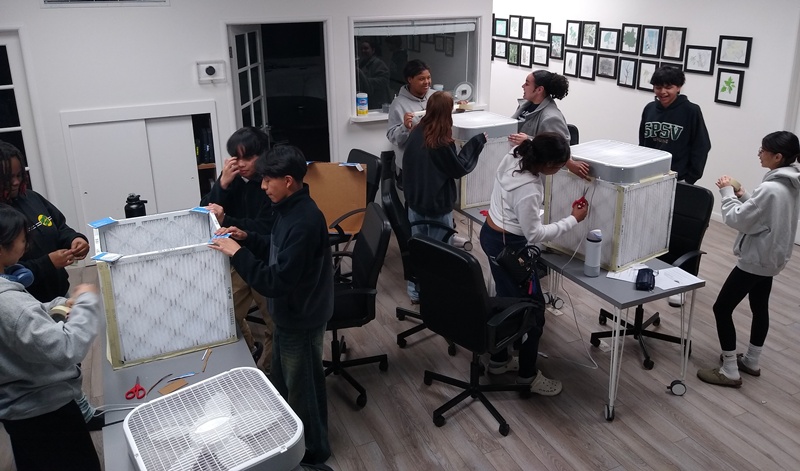
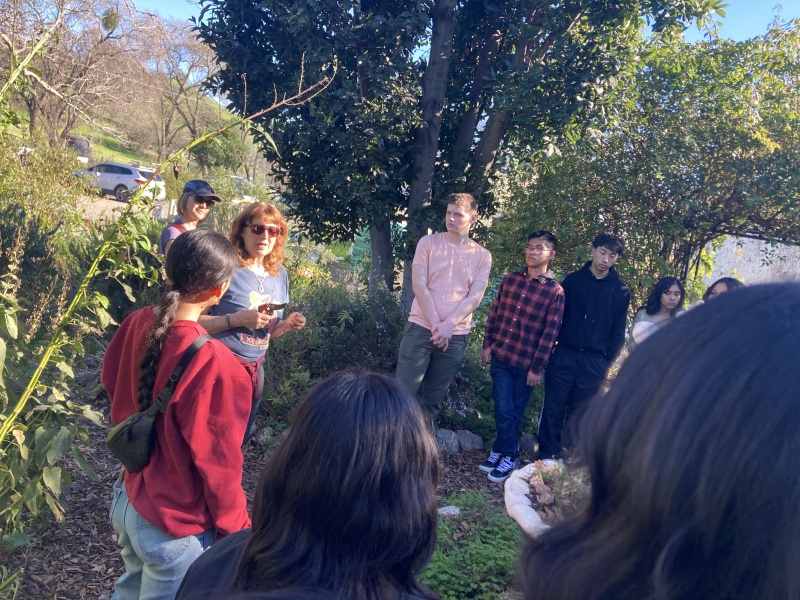
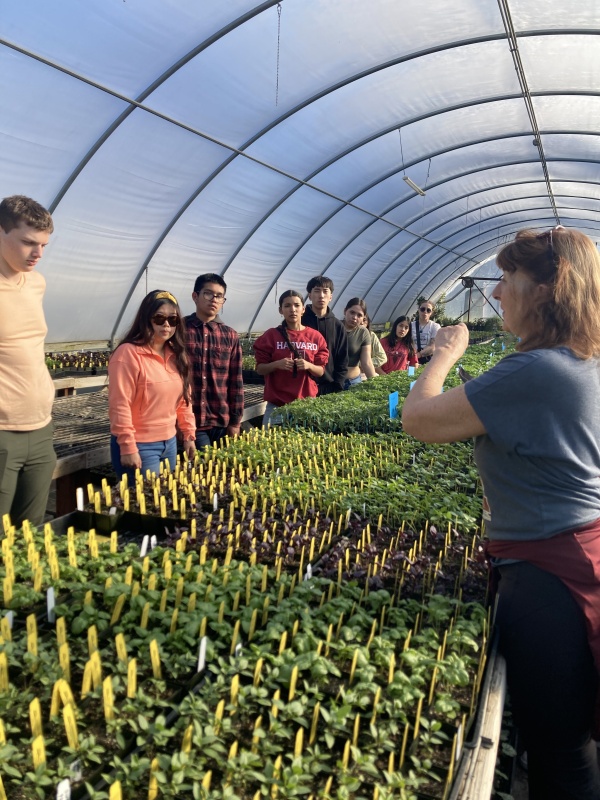
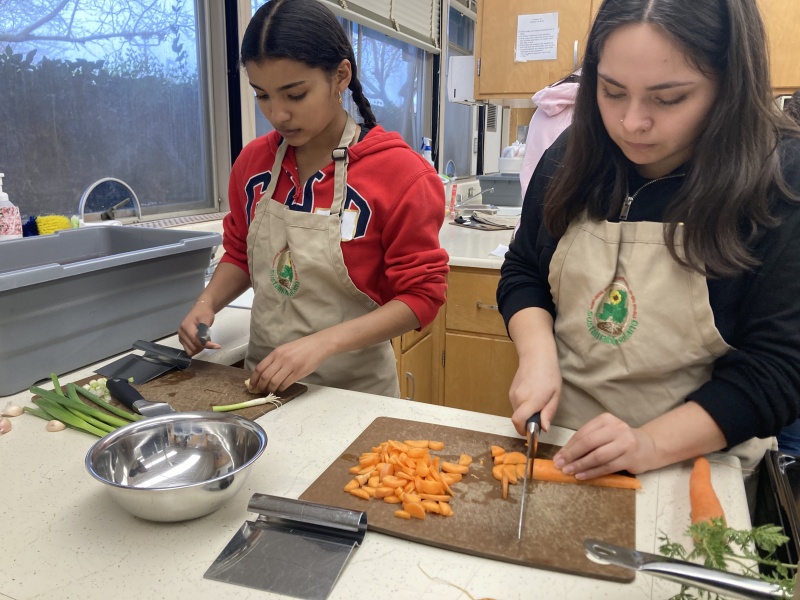
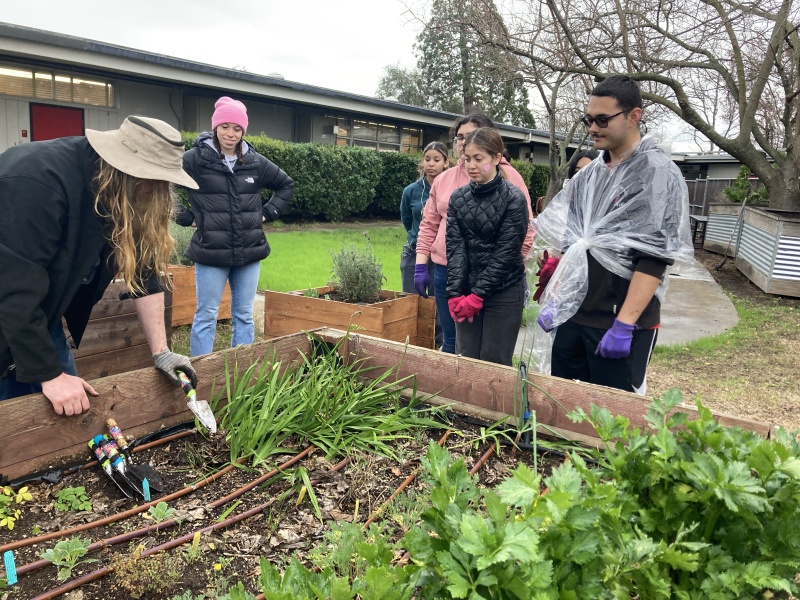
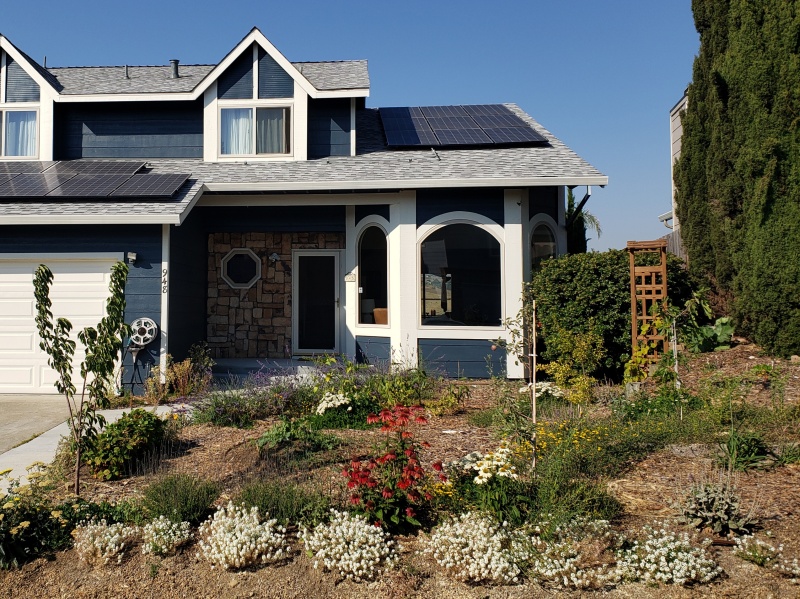
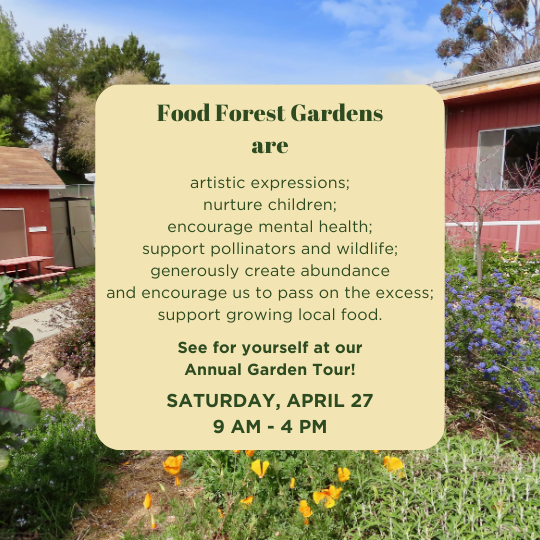
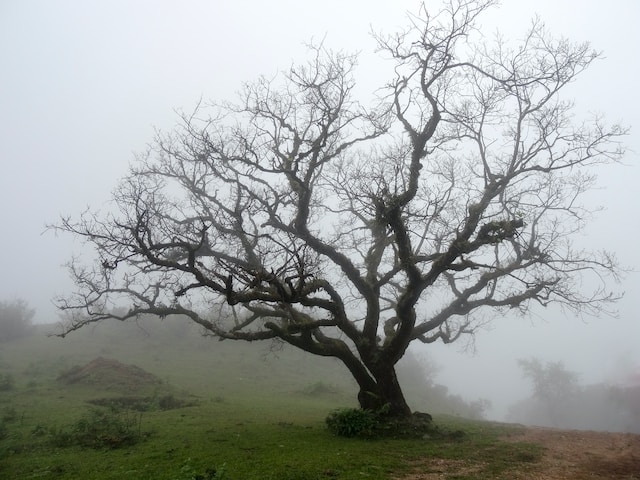
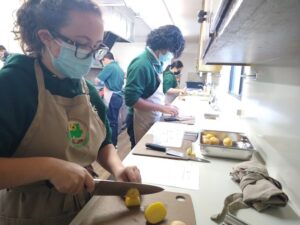 We’ve seen creative and innovative ways individuals, organizations and cities have supported such projects. In Berkeley, the Ecology Center runs
We’ve seen creative and innovative ways individuals, organizations and cities have supported such projects. In Berkeley, the Ecology Center runs